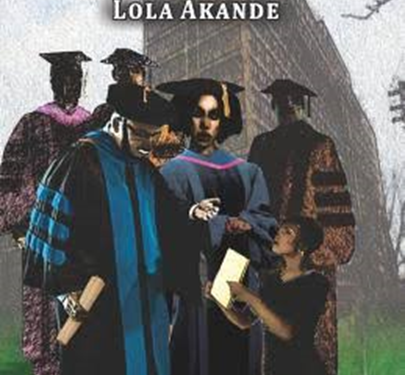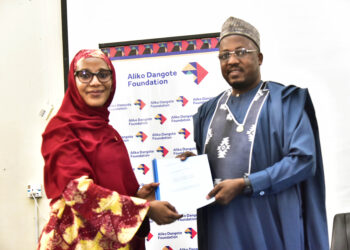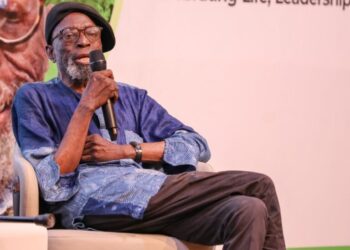By Muda Ganiyu
Was Henry Wadsworth Longfellow, the 19th-century American poet and educator, who said, “In character, in manner, in style, in all things, the supreme excellence is simplicity.”
In this regard, Lola Akande’s novel, What It Takes, is simply excellent.
The mark of good writing, like everything else in life, is simplicity. When a book flows effortlessly making it seem like the author did not make much effort writing it, you can be sure that good artistry has gone into the writing of such a book.
From the very first page of the 479-page book, the author draws you into the story such that you’re eager to know what’s next after every page, every chapter.
The theme of the book is the travails of students in the hands of their lecturers in our ivory towers, including postgraduate students.
The novel opens with the protagonist, a 38-year-old unemployed single mother of one, holding her admission letter for a Ph.D. programme at the National University of Nigeria in the country’s capital, Abuja.
Funto Oyewole, the hero of the book, had decided to go for a doctorate programme after being retrenched from her job at a Federal Government parastatal.
The admission letter reads that she is admitted for a full-time programme which would take only three years and four at the maximum.
But she was to spend a total of eight years before she could get her Ph.D.
The first hurdle she had to cross is finding a supervisor. She is told that you’re not yet a Ph.D. student until you find a supervisor.
And that is when her travails began. The first professor she approached told her, “I like you”, smiling mischievously. “I am willing to accept you as my Ph.D. student, but you must also be prepared to play the game by the rules.”
When Funto, playing innocent, asks what these rules are, the randy professor ‘throws it on the ground’, “You are not a small girl. You ought to understand that I’m a man with needs. I feel sexual urges and need to satisfy them.”
Funto could not compromise her principles, she rejects his randy demand.
She then approaches a female professor thinking that an esprit de corps should exist among her gender. But she hits a brick wall when this female professor demands a #30,000 bribe before she could give Funto a letter of consent.
The female professor lets Funto know she wants to live the good life which her meagre salary could not provide. The female professor has earlier doubted Funto’s ability to undertake the programme on account of her joblessness.
Now Funto understands.
At last, Funto is referred to Professor Charles Ephriam who neither demands sex nor bribe. However, before she could give a sigh of relief, Prof. Ephraim made her fill out her form as a part-time student instead of the full-time programme for which she was admitted while he allowed another to fill for full-time.
Professor Ephraim turned out to be a sadist and a tribal bigot who does not like people from other tribes other than his own, and Funto, as we can see from the name, is a Yoruba lady while Prof. Ephraim is from the East.
His first assignment to Funto was to recommend to her a long list of books on theory and tells her to come back only after she has read all those books; which is a normal thing with Ph.D. programmes.
But the abnormal part is that even six months, a year, or two years after reading and proving to have read these books, Prof. Ephraim ignored Funto and refuses to attend to her.
While Prof. Ephraim does not ask for a bribe, Funto’s friend and fellow Ph.D. candidate advises her to buy a gift for his 10-year-old daughter.
Funto was reluctant but as Akpan appears to be an expert on how to get a Ph.D., she caved in at great inconvenience to her, which meant using her hotel accommodation money and sleeping on campus in a lecture hall.
Still, based on Akpan’s counsel, she takes the gift to Prof. Ephraim’s house. He neither showed enthusiasm nor offered her any hospitality, and after handing the gift over to the little brat, neither she nor her mother nor Prof. Ephraim express any appreciation.
And when next Akpan suggests that she buys recharge card vouchers for the unappreciative Prof. Ephraim, Funto vehemently refused, especially since it is going to mean spending her hotel accommodation allowance to do again.
Four years later, with her thesis completed, Funto’s supervisor refuses to read her work. He says he has not time for her project yet but Funto is hoping to graduate that year.
In frustration, she reports the issue to the Head of the Department who appeals to Prof. Ephraim. It’s like pouring petrol on a fire.
Prof Ephraim threatens to withdraw his supervision but does not convey this in writing to the HOD.
Funto goes back to Prof. Ephraim, kneels down, clings to his legs, begs him, cries tears and blood, and appeals with all that’s sacred but Prof. Ephraim is adamant.
He dismisses Funto and tells her to await his rejection letter from the HOD but she is never to come to him again.
Akpan again comes to her rescue by suggesting she meets with a ‘powerful prophet’, who it turns out only wants to get into her pants.
Another prophetess wants Funto to part with half of her gratuity. Another friend, a male classmate, introduces her to a ‘Baba’, a juju man, who invokes the spirit and image of Prof. Ephraim inside a calabash filled with water and asks her to finish the professor off.
Funto balks at this wicked scheme.
To make matters worse for Funto, she overhears a heated argument between her bosom friend, Folake, who has been financially supportive, and her fiancé about how she has become a parasite and a sponge on their lives, and the couple’s plan to marry and move abroad.
Funto’s attempts to get a job only end in sexual harassment from predator men, so, she decides to take up a part-time job at the open university to make ends meet but she is never paid, and after three years, she is shown a voucher which shows she has collected her pay.
Jobless, with no Ph.D. anywhere in sight, Funto is at her tether’s end and is forced to accept the overtures of Shettima, her long-time admirer, who provides her and her now undergraduate daughter succour.
Six years after beginning her Ph.D. programme and two years from the last time she saw and spoke to her supervisor last; she receives a call from him out of the blue that she should come for a discussion in Abuja about her thesis.
The thesis had been with Prof. Ephraim for three years. However, it takes Funto another two years and a complete rewrite of her thesis to do her viva and her much-cherished Ph.D. after a total of eight years.
‘What It Takes’, as the blurb show, speaks to the “prevalence of favouritism, ethnicity, nepotism, corruption, lust, greed, and other negative tendencies ravaging the knowledge industry in Nigeria.” It also speaks to the current crisis in the university system in Nigeria where lecturers went on strike for eight months, crippled the universities, and are still insisting on being paid for those eight months they did not work. The book should be a compulsory read for all prospective Ph.D. candidates in Nigeria.
With the expose of Lola Akande, an associate professor of English Literature, at the University of Lagos, on the university system, university teachers in Nigeria should remove the speck from their own eyes first before making unreasonable demands on the federal government.
It was the Greek writer and philosopher, Aristotle, who first propagated the notion that art mirrors life.
A book in most instances is not too far from the real-life experience of the writer. I want to believe that while ‘What It Takes’ is a work of fiction and the characters are fictional, the book mirrors the delectable Lola Akande’s life.
She is a single mother who went through the Ph.D. programme, and the incidents in the book mirror her experience while undergoing the programme.
She may, however, have exaggerated some of the incidences and invented some to weave the plots of the book.
Published by Tunmike Pages in Lagos, the editing of the book is as excellent as the writing but is not without infinitesimal errors.
The copy I bought also has a few blank pages but this did not impair my reading and enjoyment of this superb book which won the 2017 Association of Nigerian Authors (ANA) prize for prose fiction.
Akande has since then come out with three other works, her latest being ‘Suitors are Scarce in Lagos’, which also won the 2022 ANA prize for prose fiction.
With these award-winning books, Lola Akande is a writer to watch out for now and in the future.




















